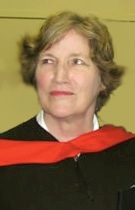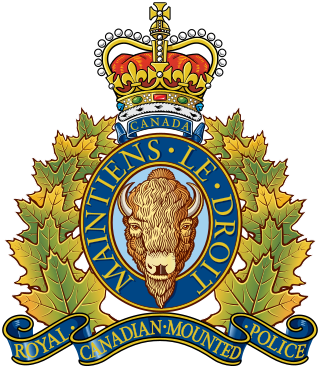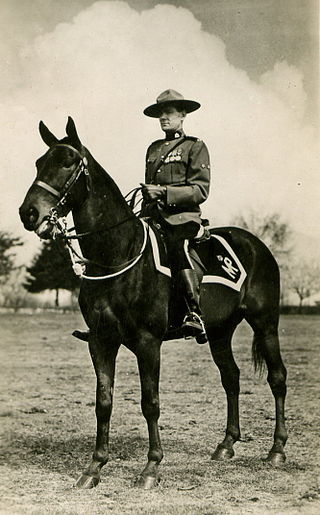Related Research Articles

The Royal Canadian Mounted Police is the national police service of Canada. The RCMP is an agency of the Government of Canada; it also delivers police services under contract to 11 provinces and territories, over 150 municipalities, and 600 Indigenous communities. The RCMP is commonly known as the Mounties in English.

Stephanie Graham "Stevie" Cameron,, is a Canadian investigative journalist and author.

"E" Division is the division of the Royal Canadian Mounted Police in the province of British Columbia, Canada's westernmost province. It is the largest police body in the province, providing federal and provincial services throughout the province and policing all but 12 municipalities. In some urban areas, some municipalities have their own police forces while neighbouring ones contract with E Division. For example, Richmond is patrolled by E Division while neighbouring Vancouver has its own police force; both organizations contribute members and resources to various regional initiatives. E Division is the largest RCMP division, with 127 local detachments.

Wallace Taroo "Wally" Oppal, is a Canadian lawyer, former judge and provincial politician. Between 2005 and 2009, he served as British Columbia's Attorney General and Minister responsible for Multiculturalism, as well as Member of the Legislative Assembly of British Columbia for the riding of Vancouver-Fraserview as part of the BC Liberals.

Richard Thomas Coleman is a Canadian politician and former police officer who served as a Member of the Legislative Assembly (MLA) in British Columbia, representing Fort Langley-Aldergrove from 1996 to 2017, and Langley East from 2017 to 2020. As part of the British Columbia Liberal Party caucus, he served in several cabinet posts under Premiers Gordon Campbell and Christy Clark, including as the 13th Deputy Premier of British Columbia from 2012 to 2017. He was also the party's interim leader and Leader of Opposition in British Columbia between 2017 and 2018.

The Highway of Tears is a 719-kilometre (447 mi) corridor of Highway 16 between Prince George and Prince Rupert in British Columbia, Canada, which has been the location of crimes against many women, beginning in 1970 when the highway was completed. The phrase was coined during a vigil held in Terrace, British Columbia in 1998, by Florence Naziel, who was thinking of the victims' families crying over their loved ones. There are a disproportionately high number of Indigenous women on the list of victims, hence the association with the Missing and Murdered Indigenous Women (MMIW) movement.

The Royal Canadian Mounted Police (RCMP) has a history dating back to 1873 and has been involved in several high-profile controversies.

Robert William Pickton, also known as the Pig Farmer Killer or the Butcher, was a Canadian serial killer and pig farmer. After dropping out of school, he left a butcher's apprenticeship to begin working full-time at his family's pig farm, and inherited it in the early 1990s.

The Missing Women Commission of Inquiry was a commission in British Columbia ordered by the Lieutenant Governor in Council on September 27, 2010, to evaluate the response of law enforcement to reports of missing and murdered women. The commission concluded its Inquiry in December 2012, and outlined 63 recommendations to the Provincial government and relevant law enforcement. The Inquiry itself received criticism from various civil society group and Indigenous communities, regarding its investigative structure, as well as, the lack of government action after the Inquiry to fulfill its recommendations.

On October 14, 2007, Robert Dziekański, a 40-year old Polish immigrant to Canada, was killed during an arrest at the Vancouver International Airport in Richmond, British Columbia (BC).
Edward N. "Ted" Hughes was a Canadian judge. He was best known for overseeing prominent investigations in Manitoba, Saskatchewan and British Columbia, one of which led to the resignation of Premier Bill Vander Zalm.

The Mount Cashel Orphanage, known locally as the Mount Cashel Boys' Home, was a boys' orphanage located in St. John's, Newfoundland and Labrador, Canada. The orphanage was operated by the Congregation of Christian Brothers, and became infamous for a sexual abuse scandal and cover-up by the Royal Newfoundland Constabulary and NL justice officials.
The Women's Memorial March is an annual event which occurs on February 14 in honour of the lives of missing and murdered indigenous women and girls (MMIWG) across Canada and the United States. This event is also a protest against class disparity, racism, inequality and violence.
Brian McConaghy is the founder of Ratanak International and a former Canadian forensic scientist who left the Royal Canadian Mounted Police (RCMP) in order to dedicate all his energies to ending child abuse and human trafficking in Cambodia. He had already founded Ratanak International, in 1989, a Christian charity dedicated to helping the people of Cambodia rebuild their country that for decades had been torn apart by civil war, revolution and genocide. From 1990 onwards McConaghy and Ratanak partnered on projects that built clinics, hospitals and schools, opened orphanages, provided shelters for the elderly and AIDS victims and ran and initiated emergency food distribution programs in response to droughts and flooding in Cambodia. In 2004, these relief projects continued, yet Ratanak's work also took on a whole new dimension by beginning to work on the front lines in Cambodia on projects that rescue and rehabilitate children sold into sexual slavery.
Janet Merlo joined the Royal Canadian Mounted Police (RCMP) in 1991 and was transferred to British Columbia. In 2007, she filed a lawsuit against the RCMP for what she described as almost daily harassment. In 2010, she took a medical discharge from the police service. In 2012, after speaking publicly about gender based harassment in the RCMP, Merlo became the representative plaintiff in a proposed class action lawsuit against the force and the Solicitor General of Canada. The group of current and retired female police officers who have requested to join the class action has now grown to almost 400. In June, 2015, Merlo's lawyers presented arguments to the court in British Columbia asking for class action status, due to allegations of systemic sexual harassment and misconduct.

Missing and Murdered Indigenous Women (MMIW), also known as Missing and Murdered Indigenous Women and Girls (MMIWG) and more broadly as Missing and Murdered Indigenous Relatives (MMIR) or Missing and Murdered Indigenous People (MMIP), is a human rights crisis of violence against Indigenous women in Canada and the United States, notably those in the Indigenous peoples in Canada and Native American communities, but also amongst other Indigenous peoples such as in Australia and New Zealand, and the grassroots movement to raise awareness of MMIW through organizing marches; building databases of the missing; holding local community, city council, and tribal council meetings; and conducting domestic violence trainings and other informational sessions for police.
Lorimer Shenher is a Canadian writer and former police officer. The former head of the Missing Persons Unit of the Vancouver Police Department, he is most noted for his 2015 non-fiction book Lonely Section of Hell: The Botched Investigation of a Serial Killer Who Almost Got Away, about the regulatory and bureaucratic failures that hampered his investigation of serial killer Robert Pickton. The book was a shortlisted finalist for the Edna Staebler Award and the City of Vancouver Book Award in 2015.
The Royal Canadian Mounted Police (RCMP) is Canada's national police force established in 1920 after the Cabinet moved to have the Royal North-West Mounted Police absorb the Dominion Police. The RCMP's primary mandate is to maintain "peace and order," and Officers provide police services to all Canadian provinces, excluding Québec and Ontario, as well as to the three Canadian territories, and more than 180 municipalities and Indigenous communities.
On July 8, 2021, Jared Lowndes, a 38-year-old member of the Wetʼsuwetʼen First Nation, was fatally shot by Royal Canadian Mounted Police officers in Campbell River, British Columbia. In late 2022, the British Columbia Independent Investigations Office released a statement that the officers "may have committed offences in relation to various uses of force" and is preparing a report to submit to Crown Counsel. The identities of the three RCMP officers involved in the shooting have not yet been made public.
References
- ↑ "Female RCMP officer says male colleagues told her they fantasized serial killer Pickton would gut her like a pig". Aboriginal Peoples Television Network. November 23, 2011. Archived from the original on February 11, 2012. Retrieved November 25, 2011.
- ↑ Fournier, Suzanne (November 23, 2011). "Cops watched porn, skipped work instead of investigating missing women: Galliford". The Province. Vancouver . Retrieved November 25, 2011.
- 1 2 3 Dufresne, Manjula; Clancy, Natalie (2016-05-03). "RCMP settles sex harassment suit with Catherine Galliford". CBC. Retrieved 2017-09-28.
- ↑ Fournier, Suzanne (2012-04-23). "Galliford not testifying at the Missing Women Inquiry". The Province. Archived from the original on 2015-10-16. Retrieved 2015-11-13.
{{cite web}}: CS1 maint: unfit URL (link) - ↑ "RCMP denies sexual harassment claims by BC Mountie". 1130 News. July 18, 2012. Archived from the original on August 21, 2012. Retrieved December 1, 2012.
- ↑ "BC Mountie says RCMP seeking to dismiss her". CBC News. 2013-08-25. Retrieved 2015-11-13.
- ↑ "Trial set for 2015 in high-profile RCMP sexual harassment lawsuit". Canadian Press. 2013-08-27. Retrieved 2015-11-13.
- ↑ Clancy, Natalie (31 May 2015). "More women alleging harassment want to join lawsuit against RCMP". Vancouver, British Columbia, Canada: CBC News. Retrieved 17 October 2015.
- ↑ "Catherine Galliford's son one of three accused in teen slaying". CBC News. 2015-10-05. Retrieved 2015-11-13.
- ↑ Ryan, Denise (2017-02-03). "Catherine Galliford talks about PTSD and her son's murder conviction". Vancouver Sun. Retrieved 2017-09-28.